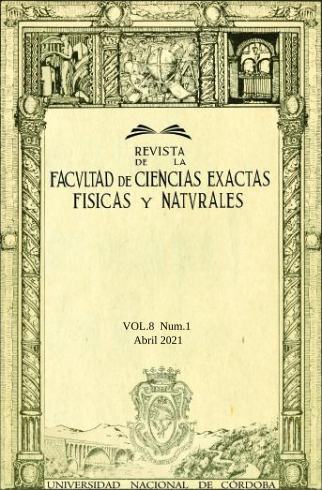El conocimiento didáctico del contenido. Estudio de casos en el profesorado de Física.
Palabras clave:
conocimiento didáctico del contenido, estudiantes de profesorado, física, astronomíaResumen
El presente trabajo describe el primer resultado de un proyecto de tesis de Maestría en Práctica Docente cuyo objetivo principal es interpretar el proceso de construcción del Conocimiento Profesional Docente (CPD), particularmente en la dimensión vinculada a la relación con el Conocimiento Didáctico del Contenido (CDC) y la práctica docente en temas relacionados con la Astronomía y la Física. Se llevó a cabo un estudio descriptivo e interpretativo. Como instrumento de recolección de datos se utilizó un cuestionario de respuesta abierta. Mediante este instrumento, que consiste en dos preguntas, se procedió a describir las ideas o conceptos centrales que tiene un profesor respecto de un tema y su enseñanza, para indagar diferentes aspectos del CDC. Se presentan aquí los resultados del análisis de las respuestas al cuestionario realizadas a dos estudiantes del profesorado de Física, previamente al cursado de la asignatura Práctica de la Enseñanza. Los principales resultados muestran que ambos participantes evidencian escasos componentes del CDC al referirse a qué y cómo enseñarían un concepto disciplinar. Esto podría deberse a que aún no han transitado los espacios de enseñanza referidos a los modelos didácticos y estrategias de enseñanza. Estos resultados servirán como punto de partida para una futura investigación que incluirá un método para indagar en profundidad el CDC de los estudiantes del profesorado de Física, así como las producciones relacionadas con procedimientos reflexivos durante la cursada de la asignatura Práctica de la Enseñanza
Descargas
Referencias
[1] Abell, S & Bryan, L. (1997). Reconceptualizing the Elementary Science Methods Course Using a Reflection Orientation. Journal of Science Teacher Education. 8.
[2] Grossman, P. L. (1990). The making of a teacher: Teacher knowledge and teacher education. New York: Teachers College Press.
[3] Hashweh, M. (2005). Teacher pedagogical constructions: A reconfiguration of pedagogical content knowledge. Teachers and Teaching: theory and practice. 11. 273-292.
[4] Henze, I., Driel, J. & Verloop, N. (2008). Development of Experienced Science Teachers' Pedagogical Content Knowledge of Models of the Solar System and the Universe. International Journal of Science Education - INT J SCI EDUC. 30. 1321-1342.
[5] Hume, A., Cooper, R. & Borowski, A. (2019). Repositioning Pedagogical Content Knowledge in Teachers´ Knowledge for Teaching Science. Singapur: Springer.
[6] Loughran, J., Mulhall,P. & Berry, A. (2004). In search of pedagogical content knowledge in science: developing ways of articulating and documenting professional practice. Journal of Research in Science Teaching, 41(4), 370-391.
[7] Marcelo C. & Vaillant D. (2009). Desarrollo Profesional Docente ¿Cómo se aprende a enseñar? Madrid: Ediciones Narcea, S.A.
[8] Park, S. & Oliver, J. (2008). “Revisiting the Conceptualisation of Pedagogical Content Knowledge (PCK): PCK as a Conceptual Tool to Understand Teachers as Professionals”. Research in Science Education, 38 (3), 261–284.
[9] Perrenoud, P. (2010). La formación del profesorado: un compromiso entre visiones inconciliables de la coherencia. Revista Interuniversitaria de Formación del Profesorado, 68 (24,2), 103-122.
[10] Schön, D. (1998). El profesional reflexivo. Cómo piensan los profesionales cuando actúan. Barcelona, España: Paidós.
[11] Shulman, L. S. (1986). “Those who understand: Knowledge growth in teaching”. Educational Researcher, 15(2), p. 4-14.
[12] Strauss, A. L. (1987). Qualitative analysis for social scientists. Cambridge University Press.
Descargas
Publicado
Número
Sección
Licencia
Derechos de autor 2021 Facultad de Ciencias Exactas, Físicas y Naturales (Universidad Nacional de Córdoba)

Esta obra está bajo una licencia internacional Creative Commons Atribución 4.0.
Se permite cualquier explotación de la obra, incluyendo la explotación con fines comerciales y la creación de obras derivadas, la distribución de las cuales también está permitida sin ninguna restricción.



